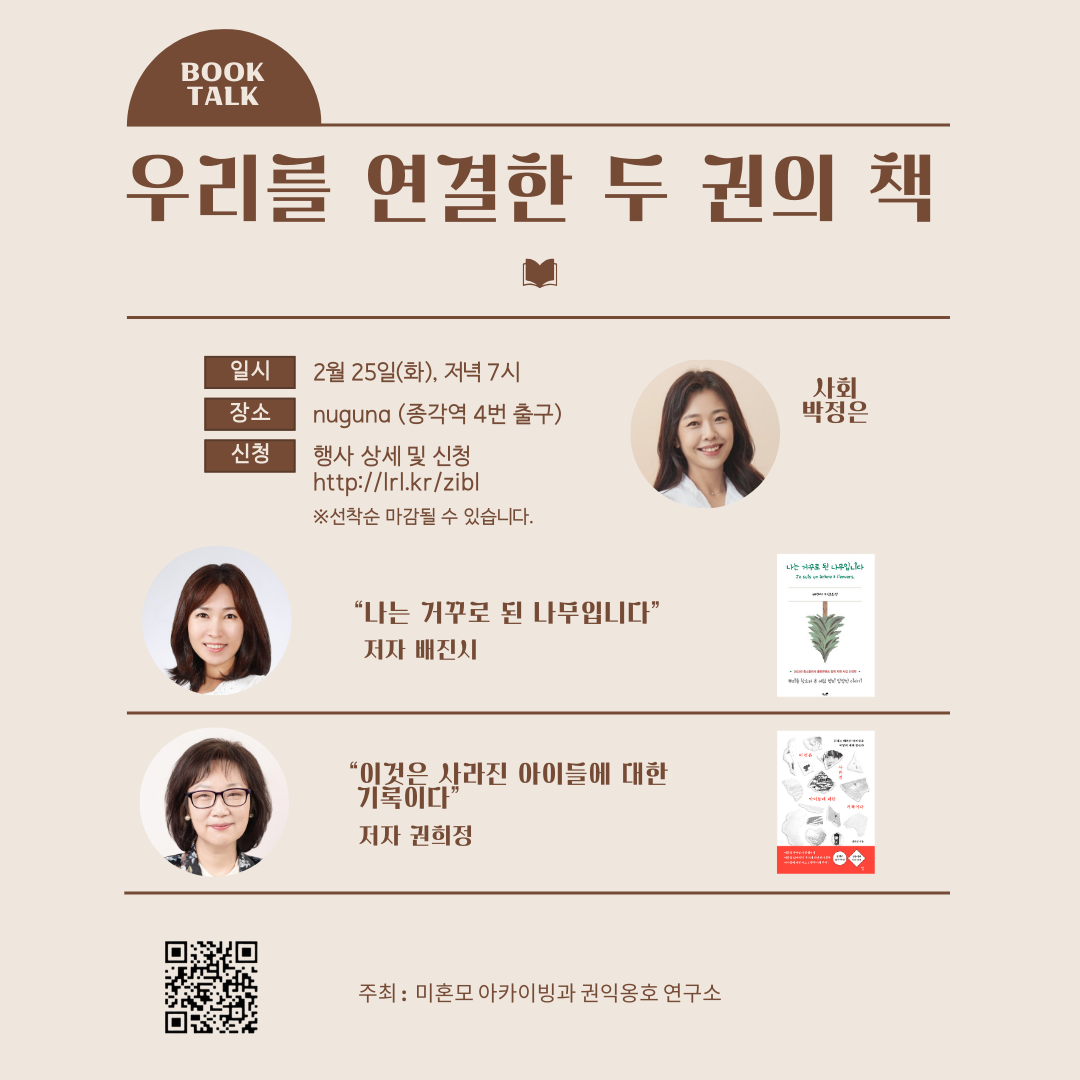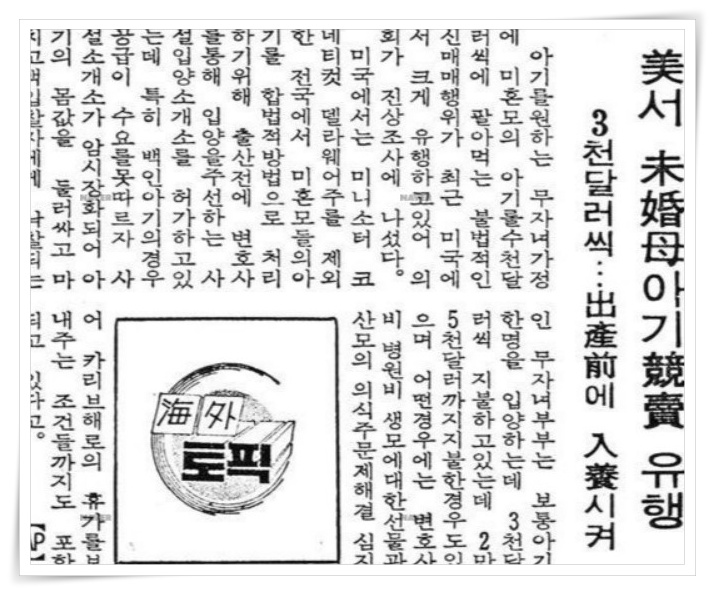Newsletter No.6 
February 4, 2025 
[Book Talk: Two Books That Connected Us] I am an ppside-down tree (Je suis un arbre à l'envers) and This Is a Record of the Lost Children These books brought these authors, once strangers, together. Now, UMI4AA hopes to extend this connection to a wider audience as we explore them. 

 [UMI4AA Advocacy] Column
The Landscape of ‘Unwed Motherhood,’ Its Transformations and Variations
Scene 1, The Invisible Presence In the summer of 2008, Dr. Richard Boas, a retired American ophthalmologist, set up an office in South Korea to support unwed mothers. He needed someone to run it, and I applied, thinking it would be similar to my previous work at a women’s organization. I got the job, and soon, the office officially became the Korea Unwed Mothers Support Network (KUMSN), with me as its executive director. When I first began my work, I encountered an immediate shock - I had no idea where to find unwed mothers. Even at meetings meant to discuss policies to support them, the room was full of academics, government officials, and related facilities staff. If an unwed mother did appear, she was anonymized as “Case 1” or “Unwed Mother 1.” They often spoke from behind partitions or in dimly lit spaces, making them unidentifiable. Photography was strictly prohibited, and any personal engagement required permission from institutional gatekeepers who claimed to “protect” them. 


[UMI4AA Advocacy] Column The Protected Birth Bill: What AI Understands, but We Ignore By August 2024, just one month after the bill’s implementation, 16 women had opted for protected birth. Within six months, that number had risen to 52. If the bill's stated objective is to promote biological family care, the increasing number of women choosing anonymous birth raises critical questions about its effectiveness. This detached rhetoric serves as little more than a strategic maneuver to deflect criticism of the Protected Birth Bill. Compounding these concerns, on January 10, the Ministry announced the creation of a new emergency care fund, allocating 1 million KRW per month for three months to support newborns awaiting placement in an institution or adoptive home. Meanwhile, financial assistance for pregnant women remains stagnant at 1 million KRW in total. Frustrated by these contradictions, I consulted an AI chat service, posing the question of whether the Protected Birth Bill truly upholds children’s right to life. The response was striking:

[UMI4AA Academic Activities] February Seminar Announcement - Date and Time: Saturday, February 22, 11:00 a.m.
- Location: Lucky Soho (Euljiro 3(sam)-ga Station, Exit 12) [Directions: https://naver.me/xoH8cng0]
- Reading for Discussion:
- So, Hyunsoog. “From models of family modernization to criticism of family “normality”: Research trends and challenges in Korean contemporary family history." Critical Studies on Modern Korean History, vol. 46, no. 2, 2021, pp. 351-388. The Institute for Korean Historical Studies.
- So, Hyunsoog. “The orphans on the boundary- A study on public welfare service focused on Korean orphan problems during the Japanese colonial period." Society and History, vol. 73, 2007, pp. 107-141. Korean Society History Association.
This seminar is open to everyone! After signing up, please read the selected article/book in advance. Come prepared to share your insights, engage with the author’s arguments, and pose any questions for discussion. ▶ UMI4AA 1st Seminar Series Sign Up: Click HERE to register for the next session.
* Registration Fee: KRW 5,000 per session
(Payment Info: Hana Bank 563-910001-36804 | Unwed Mothers Initiative for Archiving and Advocacy) 


[UMI4AA Archiving Activities] From the post-World War II period through the 1970s, unmarried pregnancy and childbirth were heavily stigmatized and discriminated against in Western societies. Consequently, hundreds of thousands of babies born to white unwed mothers were systematically placed for adoption into married, mostly childless, households. This period has been termed the "Baby Scoop Era" (Willson-Buterbaugh, 2017). See,
Karen Willson-Buterbaugh (2017) The Baby Scoop Era: Unwed Mothers, Infant Adoption and Forced Surrender However, beginning in the 1970s, the influence of second-wave feminism increased awareness around women's sexual autonomy and reproductive self-determination, facilitating a significant shift whereby single mothers increasingly chose to raise their children rather than relinquishing them for adoption. This transition resulted in a decline in the infants available for domestic adoption in the United States., prompting the emergence of illicit child-trafficking markets aimed at securing babies from unwed mothers. Simultaneously, interracial and transnational adoption surged as adoptive parents in the United States began to source children internationally. The marked rise in the overseas adoption of infants born to unwed mothers in South Korea after the 1970s is intricately tied to these broader transformations within the American adoption landscape. - Headline: "Black Market for Babies Booms as U.S. Senate Holds Hearings on Legal Issues"
- Subheading: Shortages Lead to Importing Pregnant Women from West Germany, "Baby Farms" Operate Openly in Miami
- Date of Publication: May 17, 1975
- Headline: "The Rising Trend of Auctions for Unwed Mothers' Babies in the U.S."
- Subheading: $3,000 Per Child... Adopted Before Birth
- Source: Kyunghyang Shinmun
- Date of Publication: April 29, 1975



[The 1st UMI4AA Annual Call for Papers]
The term “unwed mother” intersects with a range of complex themes, including minority identity, otherness, motherhood, family normativity, adoption systems and practices, mixed-race and non-mixed-race identities, orphans, child abandonment, the rights of children born outside marriage, social stigma, poverty, diaspora, Christianity, and even eugenics. However, scholarship on unwed motherhood has traditionally framed single mothers primarily as welfare recipients, inadvertently re-marginalizing them and reinforcing the stigma surrounding unwed motherhood.
In response, Unwed Mothers Initiative for Archiving and Advocacy (UMI4AA) is pleased to announce the 1st Annual Call for Papers. This initiative seeks to promote scholarship that examines unwed motherhood as a historical concept and social phenomenon, exploring how “unwed motherhood” has been constructed, represented, transformed, and politicized over time. We warmly invite scholars from diverse academic disciplines to share their perspectives and insights on this critical topic. 

Unwed Mothers Initiative for Archiving and Advocacy (UMI4AA) (+82)-31-772-8639 umi4aa@gmail.com

|
